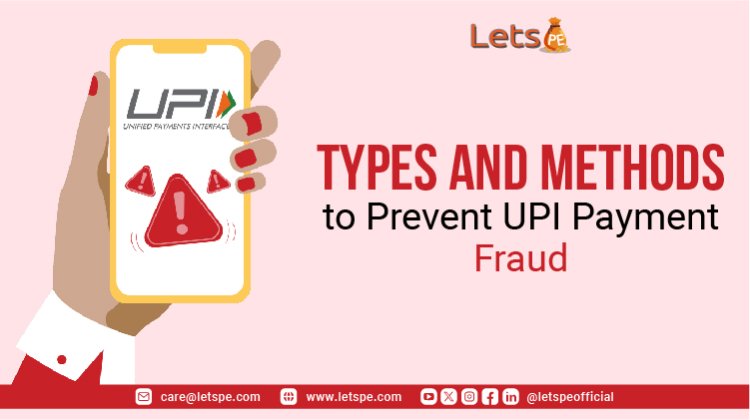Types and Methods to Prevent UPI Payment Fraud
Avoiding engaging with UPI fraud is the unique way to cover yourself from fraudsters. UPI fraud refers to fraudulent conditioning and cheating that take place within the Unified Payments Interface (UPI) system in India with reference to UPI grounded digital transactions.

UPI frauds are increasing in India due to the rise of digital deals. There were more than 95,000 cases of UPI fraud reported in the 2022-23 financial year, according to Finance Ministry of India data. Understanding the types of UPI payment frauds can help you stay safe. Fraudsters frequently employ tactics similar to UPI ID fraud, where they create fake IDs to cheat users. To protect yourself, change your UPI pin regularly and be apprehensive of common deception. Flash back, UPI deception prey on fear, rapacity and emotion. Stay careful and educate yourself to avoid falling victim to UPI fraud.
What's UPI Fraud?
UPI fraud refers to fraudulent conditioning and cheating that take place within the Unified Payments Interface (UPI) system in India with reference to UPI grounded digital transactions. Fraudsters use various practices to deceive individualities and exploit sensibility in the UPI ecosystem. Fraudsters frequently trick you into revealing their UPI pin or particular information, enabling them to enter your bank accounts and carry out fraudulent deals.
Types of UPI frauds online frauds

Common UPI payment frauds include entering fake payment requests on your device or scammers getting unauthorised access to your UPI accounts. Fraudsters engage tactics like phishing, SIM switching or creating fake UPI IDs to cheat users. Being concerned about these frauds and taking preventative measures can help you stay safe while conducting digital deals.
Phishing
Phishing is one of the most common UPI transaction frauds. Fraudsters send fake emails to enter sensitive information. Once you put your crucial details into the fraudulent point, the information is incontinently passed on to the hacker for misuse. This way, you become more liable to UPI deception.
Fraud Sellers
Fraudulent sellers are currently in online commerce. These fraudsters deceive unknowing buyers by dealing fake products or getting the order reused but not delivering the product. This leads to financial losses and a breach of trust in the E-commerce website.
Fraud Through Screen Monitoring Apps

People with heartless intent can exploit screen monitoring apps to compromise your sequestration and security. These apps allow fraudsters to capture sensitive information like UPI pins, OTPs and other particular details by recording your screen conditioning without your knowledge. This allows them to gain access to your banking information and conduct fraudulent conditioning.
Malware
Malware is one of the most common forms of UPI fraud. It can be instantly downloaded from a fake SMS attachment or an unsafe and unsecured website. Malware is designed to prize and copy data from the infected device.
Money Mule
A money mule is a more complicated fraud. Once your financial data is achieved, fraud rings transfer money to an interceder account to house the spoil. This account acts as one of the money mules to demesne money collected from different unknowing victims. This type of fraud is also common in UPI hacking.
SIM Cloning
SIM cloning is a recent addition that has increased rapidly after the OTP-obligatory rule by banks. However, they can get the OTP on their device and also indeed change your UPI pin, If a fraudster duplicates your SIM. The fraudster gets hold of your bank account details and ID evidence to reset the PIN. Within a nano-second, you'll become a victim of UPI fraud.
Misleading UPI Handles
Fraudsters frequently create deceptive UPI handles to trick unknowing users. These deception can be done on various platforms, similar as social media, online commerce, or through unasked SMS. Fraudsters may use attractive offers or critical requests for payment to cheat you into making transactions to their fraudulent UPI handles.
Vishing
Vishing refers to fraudsters representing bank representatives, asking questions on behalf of the bank. These individualities criss-cross a web of lies and enquire about your particular information to extract your PIN or password.
Collect Request
A common type of UPI fraud is when fraudsters may request a collect payment from you using your UPI apps. They can indeed ask for debit reversal or other refund-related conditioning. They may refer to a legitimate body or claim to be aiding you with a sale issue. In reality, they're trying to cheat you into furnishing sensitive information or initiating fraudulent transactions to their accounts.
How Do Hackers Execute UPI Fraud?

It’s been observed that fraudsters follow a pattern whilst executing these garnished plans. As a result, we’ve managed to weave an accretive timeline of how these plans are generally performed. Let’s take a look at how UPI fraud occurs
Step 1:- It all starts with a random call. Fraudsters generally call targets to get their attention, as opposed to texting. They generally trickery themselves as a bank representative, calling for a seemingly inoffensive issue.
Step 2 :- To make the call sound legal, they ask verification questions like your date of birth, name, or mobile number.
Step 3 :- There's always a problem. Hackers use specialized difficulties in the app or website to talk to you. They generally create fake stories that move you to lose your particular information to resolve the issue.
Step 4 :- Once the fraudster has convinced you, they ask you to download an application on your phone. Some of these apps are AnyDesk and ScreenShare, which are available on the Google Play Store.
Step 5 :- While downloading AnyDesk or an analogous operation, it asks for detachment authorization, like other regular apps. But don’t be fooled; these apps can probe everything on your phone.
Step 6 :- The fraudster will also ask you for a 9 digit OTP generated on your phone. As soon as you reveal the code, the hacker will also ask to grant authorization from the phone.
Step 7 :- When the app acquires all warrants needed, the frequenter starts to take complete control of your phone without your knowledge.
After gaining full access to your phone, the hacker steals watchwords and begins transacting with your UPI account. Therefore, you are one of the numerous victims of UPI fraud.
We linked other approaches, too. For example, fraudsters send an SMS and ask you to further it to another number they give. After the communication is successfully transferred, the fraudster can link your mobile number or account through UPI to their mobile.
A companion to UPI Fraud Prevention
Frauds aren’t unstoppable; they can be avoided by taking some essential preventives. These tips aren’t just to keep you down from fraud; they're also learning effects to keep in mind to keep your information safe in the Internet period.
Beware of engaging with fraudsters
Avoiding engaging with UPI fraud is the unique way to cover yourself from fraudsters. Your bank will never call to discuss your sensitive information. However, that’s a red flag right there, If you admit any call asking you to do the same. You can check for the authenticity of unknown figures via apps like Truecaller, which has a global database of figures flagged by users.
Pay attention to SPAM warnings on your UPI app

UPI apps like Google Pay and PhonePe generally present a spam warning if you admit a request from an unknown account. So, keep an eye out for such warnings.However, report them as spam, If you spot any suspicious accounts.
Avoid using open Wi-Fi
Using open/public Wi-Fi for banking or UPI apps is never a good idea as it may give hackers a chance to probe everything on your device. Rather, always check if the Wi-Fi is secure before connecting to it.












